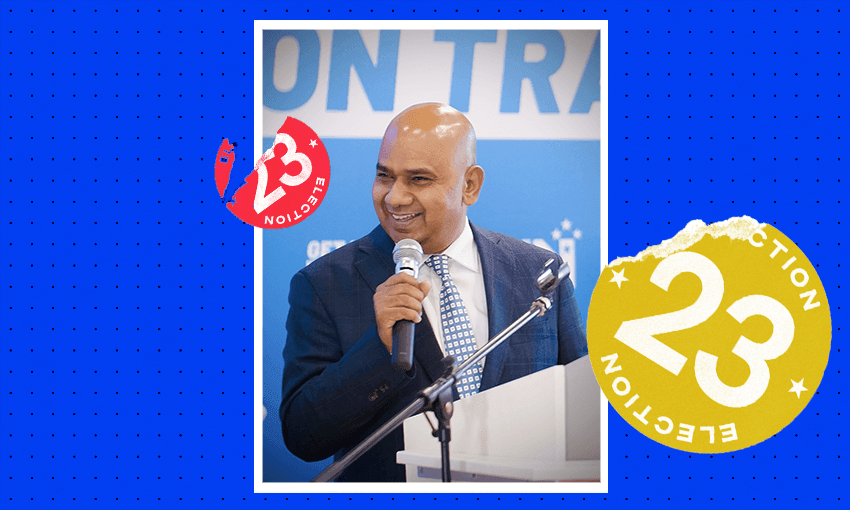National candidate Karuna Muthu’s first visit to parliament was in 2002 to protest Winston Peters. This year he hopes to return as the MP for Rongotai.
“Stop racism, stop racism, stop racism.”
Karuna Muthu climbed the steps of parliament in pursuit of the man he came here to protest: Winston Peters.
Muthu grabbed Peters by the shoulder. The two men faced each other, red faced, each raising their voices louder and louder.
“I shouted him down,” recalls Muthu. “Every time he opened his mouth, I shouted him down again.”
It was 2002 when Karuna Muthu first took his voice to parliament. He’d grown increasingly incensed at the rhetoric Peters, who was then one of 13 NZ First MPs in parliament, was using to describe migrants – the latest offence had been a claim that refugees were restricting New Zealanders’ access to health.
His one-man anti-racism protest caused a minor media storm at the time, and earned support from MPs across the political spectrum.
This year, Karuna Muthu hopes to return to parliament as an MP. He’s the National Party candidate for Rongotai.
Muthu still shares the same beliefs, but 21 years on, his approach has changed. “In the past, I had been an activist. What I learned is that you can achieve your goals in many ways. I try to do those things in a different way now. I hope I’ve gotten wiser,” he says.
Muthu has continued to advocate for the rights of migrants and for greater recognition of the Indian diaspora in Aotearoa. He is president of Wellington Mutamizh Sangam, a group which promotes Tamil language and culture.
He’s a longshot candidate for the electorate and is ranked at 51 on the party list – almost certainly too low to win a seat this election. Running a no-hoper campaign isn’t new to him. He stood for United Future in Rongotai in 2008, for Wellington mayor in 2013 and for council twice. None of his previous attempts garnered more than 1,000 votes. But winning wasn’t the point, he says.
“I ran to nudge ethnic communities to get involved,” he says. “It doesn’t matter if they’re running for school board or parliament. I wanted to encourage people like me to take part in the democratic process. I feel it is important. At first we may not succeed, but we keep at it, and we will have our say.”
In a way, he’ll win regardless: 2023 will be a victory for Indian representation. The next parliament will almost certainly contain the largest-ever contingent of politicians with Asian heritage. National has three Kiwi-Indian candidates in winnable list spots– Siva Kilari, Mahesh Muralidhar and Navtej Singh Randhawa.
“The National Party itself has come a long way and the country has come a long way,” Muthu says.
He puts himself at the moderate end of the National Party. “People can’t put me in a box. I’m often asked: why the National Party? Are you welcome there? My answer is yes, it is a broad church. And I’m there because I believe in their values.”
Muthu is descended from a political dynasty in his hometown of Madurai. His father was the mayor of the city and a co-founder of DMK, currently the ruling party of Tamil Nadu. He moved to New Zealand in 1995 with his wife, Chitra, who is a GP. “We kind of tried to get away from it all and lead a normal life,” he says.
The pair were born to different castes and wanted to start a new life together. “We saw New Zealand as a country that was pretty liberal and progressive. It’s an egalitarian and flat society.”
Another factor in choosing New Zealand: his eldest daughter, who was born with severe autism. “We saw that New Zealand as a society gives the space for people like my daughter and other families with disabled children.”
He worked as a car park attendant for Wilson’s Parking while he retrained at Victoria University law school, eventually becoming a barrister, business consultant, and serving on the board of several organisations.
The Indian diaspora in New Zealand makes up 5% of the population and contributes at least $10 billion annually to the GDP, according to a 2020 report by Sense Partners.
Indian-New Zealanders are considerably more likely to have undergraduate and postgraduate degrees compared to the general population and have higher rates of employment, but tend to earn less on average – $50,000 in 2018, compared to $55,400 for all ethnicities.
“People like us have to work doubly hard or harder to get the same opportunities as others,” he says. The ladder seems to grow longer and longer. It never ends. Although New Zealand has been a fantastic home for us, there is an underbelly of bigotry and discrimination.”
Muthu says the Indian community has been under-represented and under-appreciated by wider New Zealand society. “Let me be frank: Pākehā, Māori, Pasifika versus Asians or Africans; I think there is a disconnect. We are not a bicultural country any more. We are a multicultural country. We have to recognise that. We as [Indian]-Kiwis who contribute to the economy and the community are not recognised or rewarded for our contribution.”
This election, Muthu’s old foe Winston Peters looks resurgent and could find his way back above the 5% threshold and into parliament. On the prospect of a National-NZ First coalition, Muthu is diplomatic – he says his leader Christopher Luxon will make “a rational decision”.
But his personal views are clear: he hopes the voters of New Zealand have moved on. “I don’t know whether Mr Peters is the representative of New Zealand today.”
“His pinstripe suits and cigar smoking and drinking whisky might be fantastic for some people, but he is from the past, and that’s where he belongs.”

